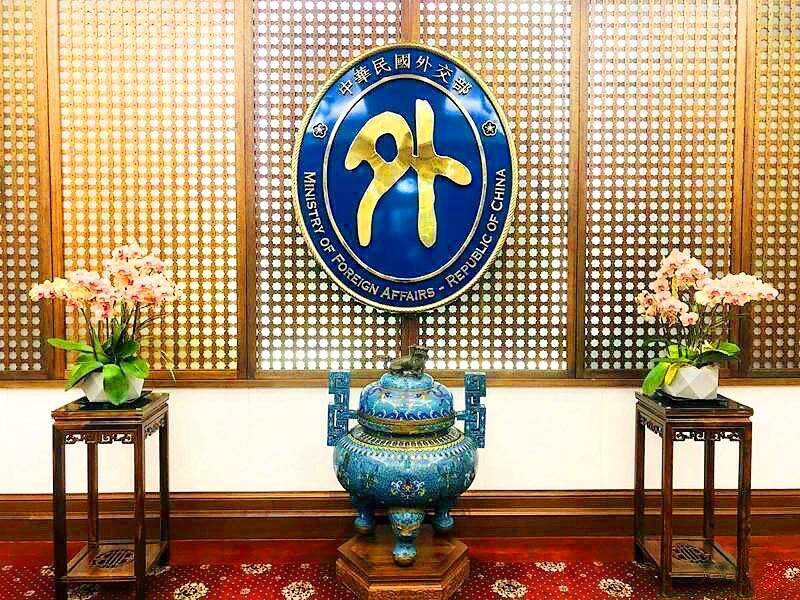Taiwan yesterday condemned Beijing’s “dangerous” behavior after a collision between Chinese and Philippine coast guard vessels in the South China Sea left four Filipino crewmembers injured.
The nation expresses “grave concern” over the rise in tensions in the disputed waters of the South China Sea and “condemns” Beijing’s activities in the region, the Ministry of Foreign Affairs said in a statement.
The Chinese coast guard has used “water cannons and dangerous maneuvers” to impede Philippine patrol vessels and supply ships near the Scarborough Shoal (Huangyan Island, 黃岩島) and Second Thomas Shoal (Renai Shoal, 仁愛暗沙), which again resulted in a collision on Tuesday, the ministry said.

Photo: Yang Yao-ru, Taipei Times
“The ministry reiterates its opposition to any activity that jeopardizes security in the South China Sea or poses harm to the region’s peace, stability and status quo, while calling on both parties to follow the provisions of international law, exercise restraint and avoid the use of force,” it said.
Taiwan supports freedom of navigation and overflight in the South China Sea without relinquishing its legal claims to the disputed islands and their surrounding waters, the ministry said.
It also opposes any attempt by a claimant to use threats, coercion or force to resolve South China Sea disputes, it added.
Taipei continues to follow the policy declared in 2016 by President Tsai Ing-wen (蔡英文) under which claimants would ideally set aside their disagreements to cooperate in developing the area’s resources, the ministry said.
Separately yesterday, the ministry thanked Japanese Chief Cabinet Secretary Yoshimasa Hayashi for reaffirming Tokyo’s wish for a peaceful resolution to the Taiwan issue.
The Japanese government intends to convey its position directly to China, he told a news conference at the Japanese Ministry of Foreign Affairs on Tuesday.
Beijing’s rapid military buildup, which is being conducted without transparency, constitutes the greatest strategic challenge to the rules-based international order, Hayashi was quoted as saying in a Japanese foreign ministry statement.
Peace and stability in the Taiwan Strait is key to the national security of Japan and the global community, he said, adding that Tokyo continues to cooperate with its allies in keeping the peace.
Taiwan’s foreign ministry said it “appreciates and welcomes” Hayashi’s comments.
Taiwan is glad that members of the global alliance of democracies continue to take measures to counter authoritarian expansionism, which threatens international peace and stability, it said.
The nation is committed to a policy of bolstering its resilience and displaying its will to defend itself, as well as seeking to collaborate with like-minded countries to maintain peace and stability in the Indo-Pacific region, it said.

The Ministry of the Interior (MOI) is to tighten rules for candidates running for public office, requiring them to declare that they do not hold a Chinese household registration or passport, and that they possess no other foreign citizenship. The requirement was set out in a draft amendment to the Enforcement Rules of the Public Officials Election and Recall Act (公職人員選舉罷免法 ) released by the ministry on Thursday. Under the proposal, candidates would need to make the declaration when submitting their registration forms, which would be published in the official election bulletin. The move follows the removal of several elected officials who were

The Republic of China (ROC) is celebrating its 114th Double Ten National Day today, featuring military parades and a variety of performances and speeches in front of the Presidential Office in Taipei. The Taiwan Taiko Association opened the celebrations with a 100-drummer performance, including young percussionists. As per tradition, an air force Mirage 2000 fighter jet flew over the Presidential Office as a part of the performance. The Honor Guards of the ROC and its marching band also heralded in a military parade. Students from Taichung's Shin Min High School then followed with a colorful performance using floral imagery to represent Taiwan's alternate name

COVETED PRIZE: The US president would be a peace prize laureate should he persuade Xi Jinping to abandon military aggression against Taiwan, William Lai said US President Donald Trump should get the Nobel Peace Prize should he be able to convince Chinese President Xi Jinping (習近平) to abandon the use of force against Taiwan, President William Lai (賴清德) told a conservative US radio show and podcast in an interview. The US is Taiwan’s most important international backer, despite the absence of formal ties, but since Trump took office earlier this year he has not announced any new arms sales to the nation. Trump could meet Xi at the APEC summit in South Korea on Oct. 31 and Nov. 1. Lai, speaking on The Clay Travis and Buck Sexton

A Chinese takeover of Taiwan would severely threaten the national security of the US, Japan, the Philippines and other nations, while global economic losses could reach US$10 trillion, National Security Council Deputy Secretary-General Lin Fei-fan (林飛帆) wrote in an article published yesterday in Foreign Affairs. “The future of Taiwan is not merely a regional concern; it is a test of whether the international order can withstand the pressure of authoritarian expansionism,” Lin wrote in the article titled “Taiwan’s Plan for Peace Through Strength — How Investments in Resilience Can Deter Beijing.” Chinese President Xi Jinping’s (習近平) intent to take Taiwan by force